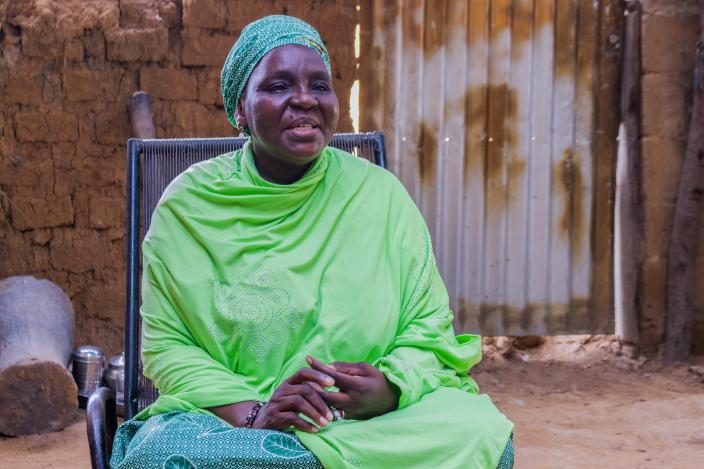“ I dream of lasting peace for my country. I dream of seeing a frank dialogue for peace.”
Laila Dicko, 53, is a teacher by trade in Mali and has been campaigning for equality and peace in her country for over 20 years. She is now the President of the regional collective of women pastoralists in Ségou, and we spoke to her about her commitment to protecting the rights of women in her community and throughout her country.
Question : Can you tell us about your journey in the fight for women's emancipation in your community?
Laila Dicko : My commitment to speaking up for women in my community began with the marginalisation of little girls from their right to education. It took time and awareness-raising among sisters in tontines and women's groups to persuade them to recognise the importance of educating little girls. Today, despite the socio-cultural constraints that surround the place of girls and women in our societies, several nursery schools have been set up and hundreds of little girls now attend kindergartens throughout the commune. This was truly the start of my battle for the emancipation of girls and women in my community.
Also, in 2004, I was elected Administrative Secretary of the Coordination of Women's Associations and Organisations (CAFO) in the commune of Macina. From then on, I took part in all the local development meetings. And every time I attend these meetings, I bring up the gender dimension in the commune's economic, social and cultural development plans.
Question : Can you tell us about any conflicts or cases of insecurity that you have experienced in your community? And how were these conflicts resolved?
Laila Dicko : It's always a cry from the heart when we address the issue of peace and human security in our community. The crisis of political leadership and the management of natural resources are the main sources of conflict that we experience on a daily basis. In both cases, these crises affect our life in the community. Land conflicts are the most recurrent, exacerbated by the kidnapping of animals and sporadic incursions by armed groups into the surrounding forests. Occasionally, animals wandering into agricultural fields can also lead to sharp tensions between farmers and herders.
Question : What was your involvement in resolving these conflicts?
Laila Dicko : In partnership with the municipality and the administrative authorities, we organise community dialogues for the peaceful settlement of disputes. We use our good offices and sometimes lobby customary authorities to intercede in the search for peace and peaceful coexistence. I remember that three or four land disputes were settled using traditional mediation mechanisms. Modern justice is not suited to resolving all conflicts. Despite a precarious respite, I am still saddened by the fact that terrorism persists, displacing dozens of women and children in our commune. To date, the resumption of school classes has been made almost impossible by the fact that internally displaced persons have to be accommodated in our schools before a site can be found for them.
Question : Why do you think women play a key role in peacebuilding in general?
Laila Dicko : In any case, I think that women have a major role to play in peacebuilding. Because peace begins in the family, then in the village and then in the whole community. Women remain the pillars of our families. And if she manages to maintain peace at family level, she will maintain peace in the village, as well as in the entire community. I think every woman should be aware of the role she can play in strengthening social cohesion and peaceful coexistence in our country
Question : Do you think that women are sufficiently involved in the search for peace in Mali? If not, what are the obstacles to their involvement?
Laila Dicko : We women are involved in conflict resolution as much as we can. It is easier for us to organise awareness-raising and advocacy activities than to use weapons to create and maintain the conditions for peace and security.
Question : What are your dreams for peace in your community/ country?
Laila Dicko : Yes, I dream of lasting peace for my country. I dream of seeing a frank dialogue for peace in our commune and further between the sons and daughters lost to armed groups and decision-makers at all levels in Mali. I dream of seeing an in-depth analysis of the conflicts for a lasting resolution of the grievances that pit us against each other. I dream that our country, Mali, will once again become a haven of peace and peaceful coexistence.
Question : Do you have anything to add that we haven't covered?
Laila Dicko : I therefore call on the international community to support Mali effectively in its search for lasting peace. I think that every national and international player should ask themselves what their share of responsibility is in managing the conflicts in my country. We have to recognise that bad governance is at the root of all the conflicts we are experiencing in our communities. I therefore call on our administrative and political authorities to impose good governance on our institutions. Every citizen must have confidence in justice and the transparent management of public affairs. It is important that our country does not make superior citizens, and even less inferior citizens.
Interview by Djigui Keita, Communications and Media Adviser, Oxfam Mal


